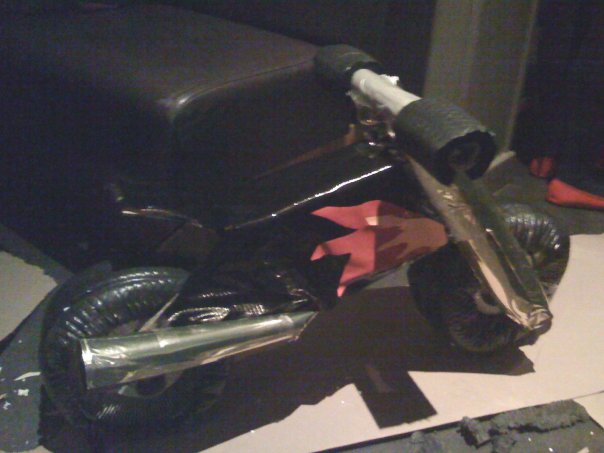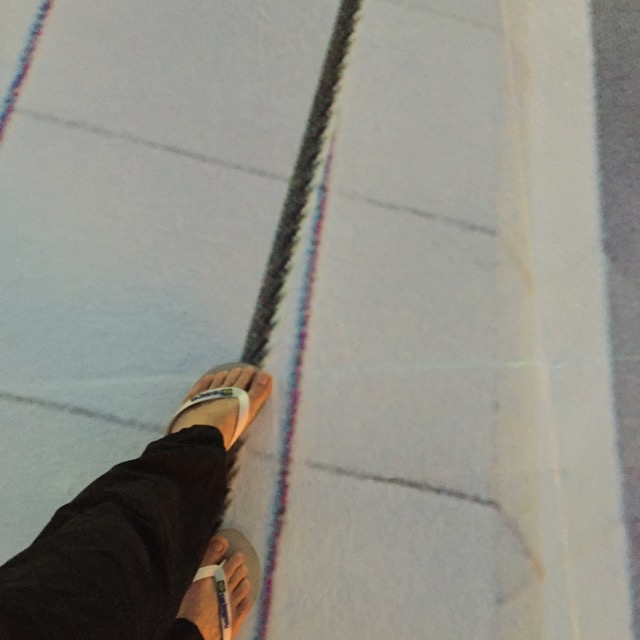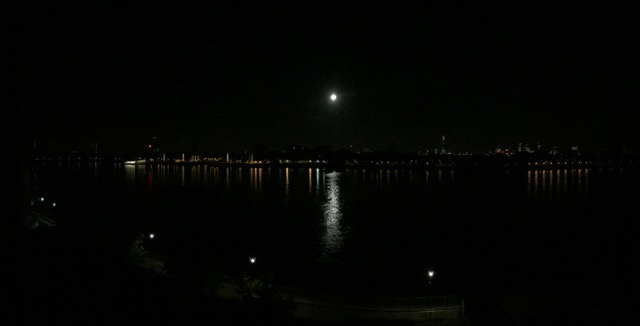This is a story about the descent into darkness...

The first time I couldn't work due to depression, it came out of the blue. I had started a new job, and it was actually really interesting. I was quite enthusiastic about what I was doing, and empowered to grow into a new role. Spring was turning into summer, and so I had the seasons in my favour. What happened next was a surprise to everybody, including me.
One morning, I couldn't get out of bed. I'd had problems getting up early for work, but this was different... I couldn't face the day. As soon as I'd admitted defeat - that I definitely wasn't going to make it into the office that day - I was somehow a changed person. It was like a dam burst. This problem that I had been barely coping with was suddenly unleashed, after 11 years of steady 9 to 5 grind and reliable service in the name of the corporations I worked for.
People talk about nervous breakdowns, and I guess that's what had happened. All of a sudden, and with little warning, I was sick... but this was an invisible sickness. I felt it, and I couldn't overcome it, but I didn't believe it was real. I thought that it was fake. I felt like a fraud.
In the UK you can take up to 3 days off work without a doctor's note. After 3 days, I knew deep down that there was no way that I could possibly go back to work, but what was wrong with me? This was highly unusual for the dependable grey-suited regular 9 to 5, Monday to Friday office Joe Bloggs, that I was. 11 years of full time work and 13 years of full time education. All I knew was getting up and going to a dictated place, on the treadmill, in the rat race, following orders.
To summon the effort to go and see my doctor took the whole of those 3 days. I knew the problem was more severe than just not feeling very well. I knew it was more severe than a day off work was going to cure. I knew that something was seriously wrong, but I couldn't express it... I had no language to explain the brick wall that I'd hit.
It was so unlike me to be lacking in energy, in purpose, in motivation and to neglect my duties, my responsibilities. It was so unlike me to not do the work. I'd had a nearly 100% attendance record at work and at school and college. Bunking off wasn't in my vocabulary. Not doing things I didn't like wasn't something I ever considered as an alternative.
I went to the doctor. I sat down and explained that I was tired. I was more tired than I'd ever been in my life. I couldn't cope. I couldn't turn the pedals of the cycle anymore. I couldn't do what I'd always managed to do, which was to drag myself out of bed, and go to school, college or work, no matter what. It hadn't mattered whether the bullying was unbearable, or the stress was intolerable, the pressure relentless... I had been that guy, that perfect student or dream employee, who always turned up and did their work, like a good little boy.
Within a couple of minutes of me explaining my unexpected interruption in my perfect attendance record, and inexplicable fatigue, my doctor said "have you heard of Fluoxetine?". I had heard of Fluoxetine: it's the generic name for Prozac, which is an anti-depressant. Fluoxetine is a Specific Serotonin Reuptake Inhibitor (SSRI) which was supposed to increase levels of Serotonin in the brain, or so Eli Lilly - the manufacturer - thought, and told the world that depressed people had unnaturally low serotonin levels in their brain. They were wrong.

The theory that depression is caused by a chemical imbalance in the brain, is ubiquitous. We are comforted to know that there is a medical problem with us, that can be corrected with medication. It's a neat little theory: depressed people don't have enough serotonin in their brain, and with medicine it can be topped up to 'normal' levels. Sadly, it's just not correct.
Measurements of the amount of serotonin metabolites in spinal fluid of depressed people who take Fluoxetine or other SSRIs are actually lower than supposedly healthy people. The theory was proven to be bunkum, but doctors and mental health professionals still share research that's 30+ years old and has been disproven. The theory was just too popular, as well as the SSRI medication, which millions of people had flocked to as their salvation.
I had read extensively in the field of psychopharmacology and had received unconditional offers of a University place at several prestigious institutions, to study psychology, pharmacology and psychiatry. I was probably better informed than my doctor.
I knew that SSRIs were associated with emotional blunting, anorgasmia (not being able to cum) and increased suicidal ideation (thinking about killing yourself). I knew that the long-term outcomes were actually worse than placebo, in several studies. I knew that an SSRI would take 6 weeks to take effect anyway, and that was no use to me. I needed to get back to work!
So, I declined the medication that was offered to me, within just a few minutes of talking to my doctor. I was shocked by how quickly I had been offered psychiatric medication from a general physician, which would take at least 6 weeks to take effect, and I could end up taking for a long time. I felt a little failed by the health services.
My doctor signed me off for a week, and I felt a little relieved to have some time to allow my body to hopefully revert to homeostasis, and I could hopefully get back to work. I felt like a real failure, and I started to feel anxious about the impression that my bosses and colleagues would have of me. Would I be seen as unreliable? Would my name be tainted?
The fatigue and lack of motivation, purpose, persisted and I spent a week in bed, sleeping for 16+ hours. I hardly ate. I didn't open the curtains. I turned my phone off and just curled up under the duvet. Where had this tiredness come from? I had always been in good physical shape and my body had never failed me like this before. I had always had plenty of energy.
I went back to the doctor after a week, and I was getting pretty desperate for an answer. I was looking for a diagnosis, a cure. I wanted the trusted men in white coats to make everything better again.

We did tests: blood tests, urine tests, thyroid function, kidney and liver function. We even did an AIDS test, as my doctor was at a loss to explain why I was so fatigued all the time. One week turned into three weeks. There was seemingly no end to my exhaustion and inability to cope with the thought of going back to work. There was no way I could face the day, for some reason. I had been housebound with the curtains closed, except for trips around the corner to the doctor's surgery.
My doctors remained convinced that I was suffering with Clinical Depression, and urged me to try an SSRI, but I still refused on the grounds that I didn't want another 6 weeks off work, while I waited for the medication to kick in. 9 weeks off work seemed ridiculous to me, and the side effects sounded unacceptable.
So I stopped going to the doctors. I stopped getting sick notes. I switched my phone off and went to bed, and I just tried to ignore the fact that I was going to lose my job. I didn't care because I couldn't care. There was no way I could go back to work, feeling so exhausted, so drained, so fatigued and unable to cope with even preparing food, getting dressed, having a shower. I just lay in my bed and slept two thirds of every day, and lay half-asleep, anxious about a knock at the door, with the curtains closed, for the rest of the time.
Everything seemed impossible, insurmountable. The idea of going to the shop seemed as insane as the idea of going on an expedition to the South Pole without any warm clothes or supplies. Clearly there was something wrong with me if I was misjudging the effort involved in things, but I also knew that I couldn't keep just doing the same shit, the same crappy 9 to 5 routine, and the same formula of working a job.
As the summer wore on, I started to get interested in the idea of doing some iPhone development work, and slowly I ventured outside into the sunshine in the afternoons, to learn how to develop software on the Apple platform. It seemed like a nice confidence-building exercise, as I had started to doubt that I'd ever be able to work again. I had started to feel like I'd be invalided out of the workforce for the rest of my days.
The more I worked, the more obsessed I became. My energy came back. Slowly at first. I would work for an afternoon, then an afternoon and an evening, and then soon I was doing full days of work again. But it didn't stop there.
By the time July had given way to August, I was working an 18 hour day. I was irritable and single-minded. Eating was a chore that would slow me down and get in the way of me working. I didn't want to waste time with my partner, my friends, my family. Nobody understood what I was working on and how important it was. Explaining anything to anybody was painfully slow and angered me to have to take time out from my work to even answer the simplest of questions.
I started to speak faster, in a rush to get the words out and not waste precious time speaking to people. I viewed other people as obstacles, standing in the way of my single goal, and as dimwitted fools who were sent to irritate and frustrate me. My thoughts raced, but I could follow them, but speaking was never fast enough to verbalise what was going on in my brain, so my speech was pressured... trying to will my tongue to be fast enough to keep pace with my thread of thought.
My work rang me up and insisted that we meet up. I saw my boss, and we agreed that I should give my notice. There was no way I was going back to that job. They were cool about things, but I didn't really have any explanation about what was going on with me.

I was free from the confines of the 9 to 5, Monday to Friday office routine. I was free from dimwitted bosses who had been promoted into positions of incompetence. I was free from bureaucracy and red tape and corporate bullshit. I just worked, and worked, and worked. I worked 7 days a week. I worked until I was falling asleep, and then I would start again as soon as I woke up.
At some point during this flurry of activity, I managed to get a couple of iPhone Apps to number one in the charts. Naturally, this brought in a lot of cash. I had done it. I had proven my point. I had unwittingly become a successful entrepreneur, off the back of becoming unwell and losing my job.
However, I failed to see it like that. What I saw instead was that office work wasn't good for me. I felt like office work had made me sick, and that I needed to find a new profession... well, a trade actually.
I decided to quit IT and software - the thing that I was really good at - and retrain as an electrician. I decided that the most important things to me were being self employed and working in a non-office environment. It took a couple of years before I finally realised I was wrong.
The same thing happened to me, except this time it was much, much faster.
The pressure on a small businessman, and a tradesman is immense. An electrician is responsible for the safety of everybody in the homes that you have installed an electrical system into. If anybody is electrocuted because of your shoddy workmanship, it's your fault. That's a lot of responsibility. Also, the public expect you to work for peanuts.
The sense of exhaustion and inability to cope with the pressure anymore, had hit me really hard in my cushy desk job. Now I had angry customers ringing me up because I had gotten sick. This was much, much worse, because they were ordinary people who I'd met and built a relationship with. Ordinary people were counting on me to wire up their homes, and I was personally failing them.
This depression was much deeper and darker, because I'd really run out of ideas. I felt completely useless, and that as a well known local tradesman, I'd ruined my reputation in my community. This was awful. I was actually afraid to leave the house, in case I bumped into somebody I knew, somebody who I'd let down.
I felt like I couldn't go backwards, and I couldn't go forwards. I was really trapped. How would people take me seriously as an IT professional if I'd previously been a lowly electrician? How would I ever work again as an independent businessman, when I had actually crashed a business due to my ill health? How could I ever be trusted again?
I started to think about suicide very seriously. I saw no way out of this cycle of depressions and failure. I couldn't see a way to earn money anymore, to work again. I couldn't imagine going back to my profession, or starting another business. Everything looked doomed to fail again and again and again.
I tried the medical route again, and finally got referred to a psychiatrist. It took a very long time before I actually met with the consultant, and the options were the same: SSRIs, SNRIs and NaSSAs. All serotonergic drugs. All with horrible side effects. All taking 6+ weeks to kick in.
I begged my psychiatrist to let me try Bupropion (sold as Zyban and Wellbutrin) which is very popular in France and is fast acting. He refused on the grounds that it was an off-label prescription in the UK and he'd have to get special permission from the NHS trust. It was more than his job was worth.
So, I resorted to self-medication.
Self medication worked... in the short term. I felt better, I could function. However, it took me down a path that led to the Dark Web, which led to drug window-shopping, and later to experimentation with just about every highly addictive hard drug known to man, including Heroin, Crack Cocaine and Crystal Methamphetamine.
Drugs don't work. The brain gets used to them, and then you have to increase the dose or switch to a more powerful drug. You can't artificially induce an organ that's designed to be balanced - homeostatically self-regulating - to be forced into an unnatural state.
What's the reason why those people who were taking SSRIs had lower serotonin levels in their spinal fluid? Well, it's because the brain realises that something is artificially out of kilter, and so it releases less serotonin to compensate, and puts you right back where you started.
In the words of The Verve: "the drugs don't work, they just make it worse".
Why do you think drugs from your doctor are good, and drugs from a drug dealer or the Dark Web are bad? Do you think your brain knows the difference? Of course it doesn't. Most of the drugs that are abused were developed by pharmaceutical companies originally, and used to be prescribed before newer 'safer' medications were developed. By 'safer' we tend to mean weaker and with such horrible side effects that taking bigger doses becomes unpleasant. In actual fact, the so-called 'drugs of abuse' have far less side effects than their 'safe' counterparts, at therapeutic doses. Anything becomes poisonous at high enough doses.
Does that mean I'm pro-drugs then? Am I soft on drugs, and one of these decriminalisation nuts?
Well, no, not really. Drugs are bad. They put your brain into an unnatural state and it's hard for your brain to achieve homeostasis when you are poking and prodding at it with the blunt instruments that are the chemicals that cross the blood-brain barrier.
Drugs can 'reset' your brain, in a similar way to electroconvulsive therapy (ECT) which is also known as 'shock' therapy.
Medicine of the brain is very early in its development. Psychiatry has only really been a medical field since the 1950's and the true mechanism of action of medications is only very poorly understood, especially as the true nature of mental illness has not yet been revealed.
My personal view is that the destruction of families, clans and villages in favour of ridiculously long working hours in an isolated urban setting, has destroyed everything we need as humans in terms of our relationships with other human beings. Mental illness is a perfectly sane response to modern life. It's a sane response to an insane world.
The thing that's been most beneficial to my mental health has been connecting with a group of friends, while being homeless. Being relieved of the isolated silence of the commuter train, and the pressure of horrible work and job insecurity, coupled with the financial pressures of paying ridiculous rent and unattainable material goals... it was sweet, sweet relief. Living in a kind of commune, with other people who were living in close quarters with each other, sounds unbearable, but it was actually nice. It was humanising. It felt natural, and a sense of calm, relaxation and connection with the world, flooded back into me. I felt a warmth within me that I'd never felt, except maybe with Heroin.
The question now on my lips is: how do I get that again? How do I recreate the sense of community I had, either with tons of kitesurfing friends, or with tons of similarly dispossessed and dislocated homeless people, all thrust together out of necessity to stick together?
The need to belong to a tribe, a group, a commune... it's undeniable, now that I've experienced it. I place an importance on it above financial security, because without it I just feel suicidal, so it's actually essential for life in a way that money just isn't.
Human connection is the answer to the riddle of depression, suicide and addiction.

I'm halfway betwixt and between. Half in the dark, and half in the light. My brain doesn't know whether to be suicidally depressed or hypomanically fixated on a single goal.
Tags: #suicide #depression #mentalhealth #bipolar #addiction #drugs #career

